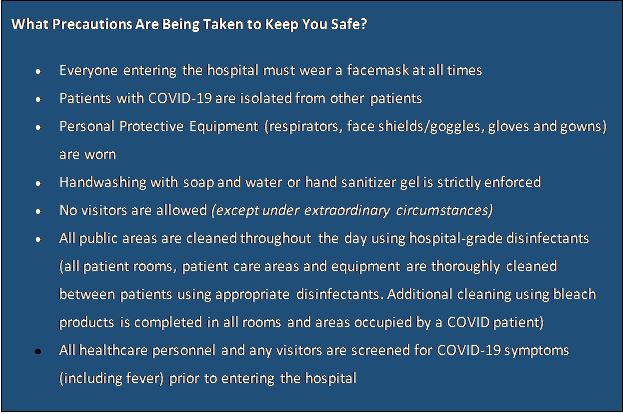General News
Emergency Medical Care During the Covid-19 Outbreak: Don’t Delay Getting the Care You Need. We Are Here for You.
May 26, 2020

Text Size:
If you are experiencing a serious illness or severe symptoms of any kind, please do not put off seeking emergency medical care due to fears of COVID-19. Delaying medical treatment could worsen symptoms or result in a life-threatening situation. In the event of a medical emergency, do not hesitate to call 911 or your doctor or visit the nearest emergency department.
Many serious conditions, such as stroke and heart attack, can be successfully treated if patients receive care quickly. Please do not delay seeking appropriate care out of fear of contracting COVID-19. Please call 911 or go to the nearest emergency department if you need medical attention. The life you save may be your own.
 Murray-Calloway County Hospital’s emergency department remains open and safe. We are open 24 hours a day, seven days a week, to care for you – whether you need treatment for COVID-19 or another emergency. We have implemented many safety measures to keep our patients and caregivers safe. The emergency department has been reconfigured to keep all patients separated. There is an isolated area for those with COVID-19 symptoms and a separate waiting room and treatment space for those with other medical conditions. All rooms are cleaned and disinfected between every patient.
Murray-Calloway County Hospital’s emergency department remains open and safe. We are open 24 hours a day, seven days a week, to care for you – whether you need treatment for COVID-19 or another emergency. We have implemented many safety measures to keep our patients and caregivers safe. The emergency department has been reconfigured to keep all patients separated. There is an isolated area for those with COVID-19 symptoms and a separate waiting room and treatment space for those with other medical conditions. All rooms are cleaned and disinfected between every patient.
What should I do if I am experiencing symptoms of a heart attack or stroke?
People do not stop experiencing heart attacks, strokes and other emergency medical conditions during a pandemic. Please do not hesitate to seek immediate medical care. If you are experiencing symptoms, such as chest pain, difficulty breathing, trouble lifting your arms, or weakness, call 911.
What should I do in a medical emergency?
At Murray-Calloway County Hospital we understand that it is not always easy to know when you or one of your loved ones needs emergency care. An emergency can be defined as a severe injury or illness that is threatening to one’s health or might cause permanent harm. They can be both physical and psychological in nature with symptoms that may include the following:
- Unconsciousness or lack of response
- Skin or lips that look blue, purple or gray
- Difficulty breathing
- Chest pain or pressure
- Acting strangely or becoming more withdrawn and less alert
- Difficulty speaking clearly or garbled speech
- Weakness, numbness or incoordination on one side of the body
- Sudden loss of eyesight
- Rhythmic jerking movements or seizures
- Neck stiffness or rash with fever
- Increasing or severe, persistent pain
- Physical trauma involving the head, chest or abdomen
- Bleeding from large or deep cuts that does not stop after applying pressure for five minutes
- Burns that are large or involve the hands, groin or face
- Head injuries accompanied by a loss of consciousness, confusion, headache or vomiting
In case of an emergency, stay calm and:
- Call 911 if you need immediate help
- Bring any medication you (or your loved one) are taking to the hospital
- If a person is not breathing, have someone who is properly trained to begin hands-only CPR
- Call the poison center at once if a person has swallowed a suspected poison or another person’s medication, even if there are no signs or symptoms
- Bring any suspected poisons or other medications the person might have taken to the hospital
- Place the person on the floor with their head turned to the side if they are having a seizure – do not put anything in their mouth
- Do not move an injured person unless there is immediate danger
- Apply continuous pressure to the site of bleeding with a clean cloth
- Stay with the patient until help arrives
Can I see a doctor online?
Yes. With a secure telehealth visit, you can consult with an experienced physician who can help diagnose, manage and treat certain conditions or symptoms—all from the comfort of your home. Telehealth can help determine if onsite emergency treatment is needed.
Thank you for being safe and trusting our expert team to care for you.
Thank you for doing your part to help slow the spread of COVID-19 in our community. Staying at home, practicing social distancing and frequent handwashing are the most important things you can do to help slow the spread of the disease. This will allow us all to protect one another and care for our most vulnerable community members.
If you are experiencing a serious illness or severe symptoms of any kind, please do not delay seeking emergency medical care. Delaying emergency treatment could worsen symptoms or result in a life-threatening situation. We are here for you 24/7.

